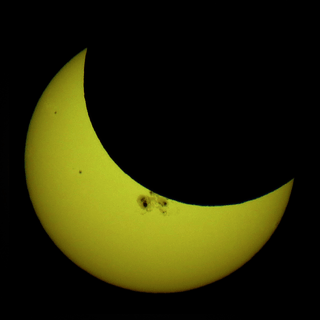Solar eclipse of January 26, 2047
A partial solar eclipse will occur on Saturday, January 26, 2047. A solar eclipse occurs when the Moon passes between Earth and the Sun, thereby totally or partly obscuring the image of the Sun for a viewer on Earth. A partial solar eclipse occurs in the polar regions of the Earth when the center of the Moon's shadow misses the Earth.
| Solar eclipse of January 26, 2047 | |
|---|---|
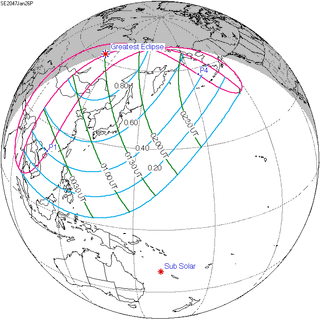 Map | |
| Type of eclipse | |
| Nature | Partial |
| Gamma | 1.045 |
| Magnitude | 0.8907 |
| Maximum eclipse | |
| Coordinates | 62.9°N 111.7°E |
| Times (UTC) | |
| Greatest eclipse | 1:33:18 |
| References | |
| Saros | 151 (16 of 72) |
| Catalog # (SE5000) | 9611 |
Images
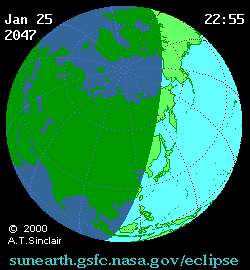
Animated path
Related eclipses
Solar eclipses of 2044–2047
This eclipse is a member of a semester series. An eclipse in a semester series of solar eclipses repeats approximately every 177 days and 4 hours (a semester) at alternating nodes of the Moon's orbit.[1]
| Solar eclipse series sets from 2044–2047 | ||||||
|---|---|---|---|---|---|---|
| Ascending node | Descending node | |||||
| 121 | February 28, 2044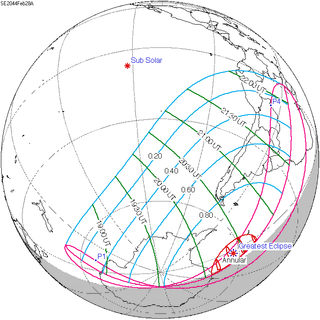 Annular |
126 | August 23, 2044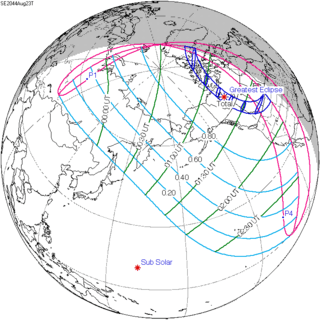 Total | |||
| 131 | February 16, 2045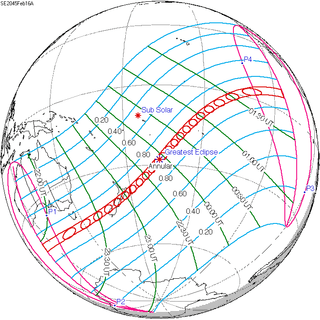 Annular |
136 | August 12, 2045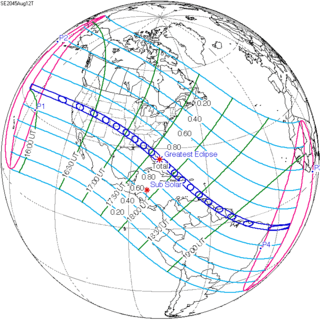 Total | |||
| 141 | February 5, 2046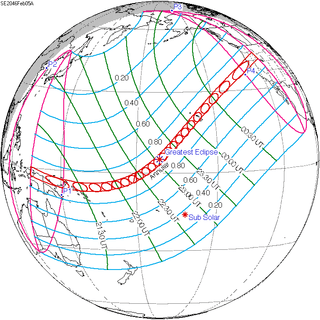 Annular |
146 | August 2, 2046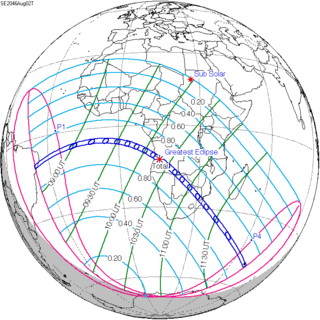 Total | |||
| 151 | January 26, 2047 Partial |
156 | July 22, 2047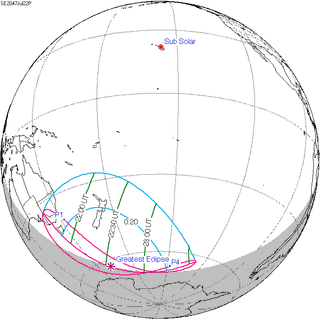 Partial | |||
| Partial solar eclipses on June 23, 2047 and December 16, 2047 occur on the next lunar year eclipse set. | ||||||
Tritos series
This eclipse is a part of a tritos cycle, repeating at alternating nodes every 135 synodic months (≈ 3986.63 days, or 11 years minus 1 month). Their appearance and longitude are irregular due to a lack of synchronization with the anomalistic month (period of perigee), but groupings of 3 tritos cycles (≈ 33 years minus 3 months) come close (≈ 434.044 anomalistic months), so eclipses are similar in these groupings.
| Series members between 1901 and 2100 | |||
|---|---|---|---|
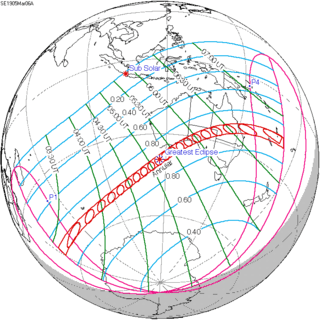 March 6, 1905 (Saros 138) |
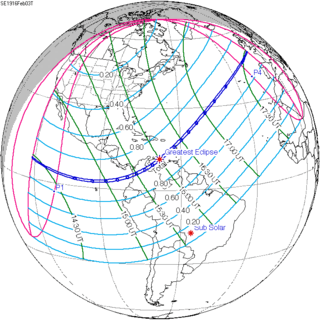 February 3, 1916 (Saros 139) |
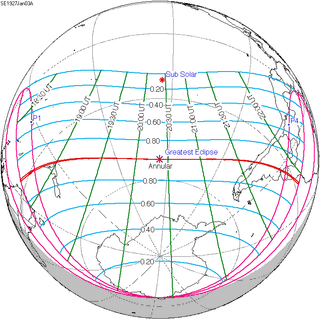 January 3, 1927 (Saros 140) | |
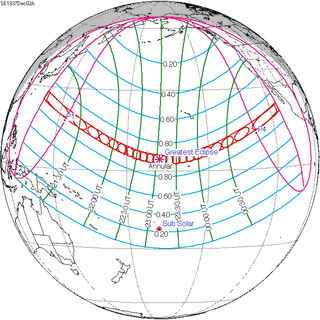 December 2, 1937 (Saros 141) |
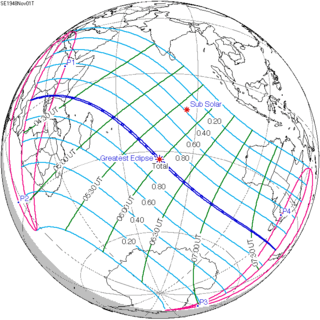 November 1, 1948 (Saros 142) |
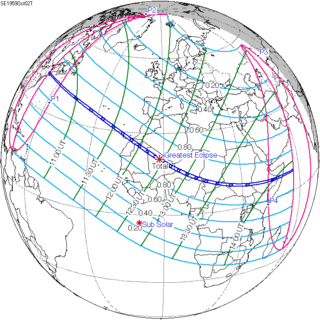 October 2, 1959 (Saros 143) | |
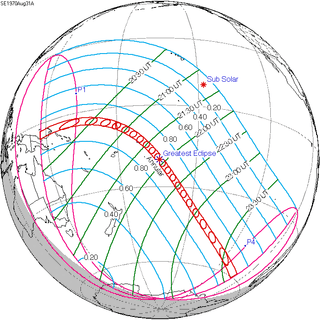 August 31, 1970 (Saros 144) |
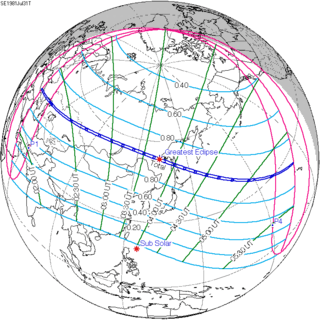 July 31, 1981 (Saros 145) |
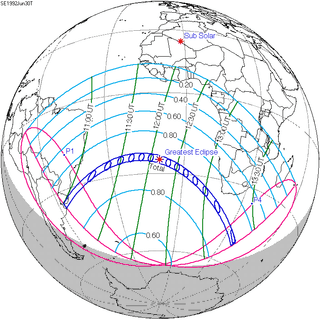 June 30, 1992 (Saros 146) | |
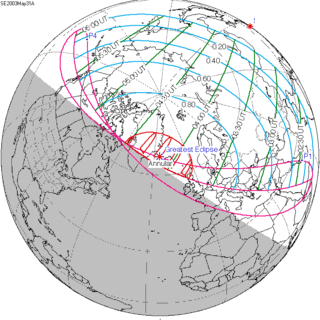 May 31, 2003 (Saros 147) |
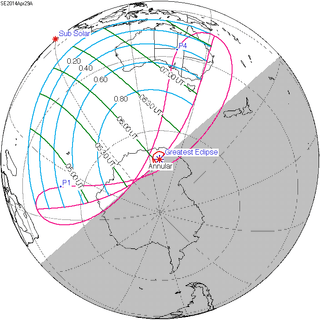 April 29, 2014 (Saros 148) |
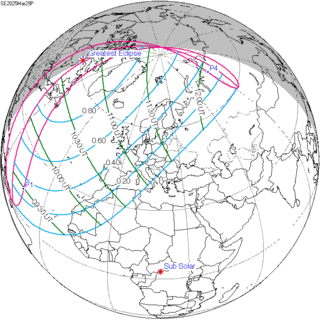 March 29, 2025 (Saros 149) | |
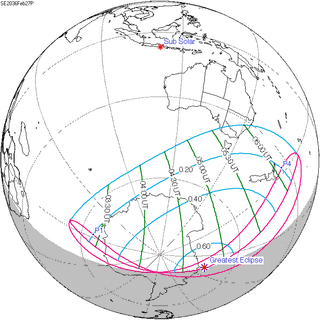 February 27, 2036 (Saros 150) |
 January 26, 2047 (Saros 151) |
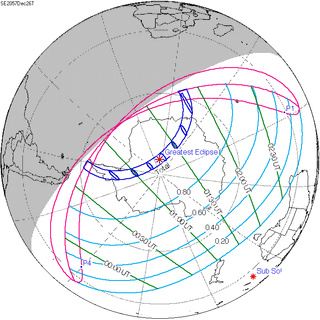 December 26, 2057 (Saros 152) | |
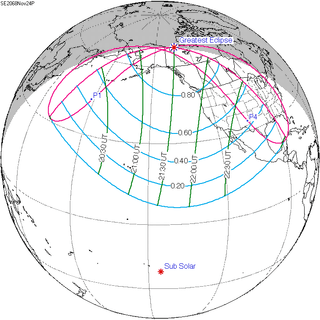 November 24, 2068 (Saros 153) |
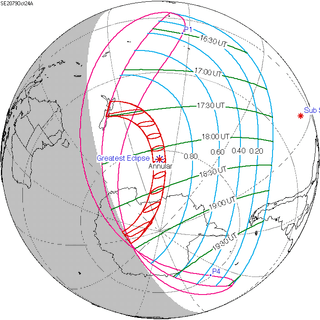 October 24, 2079 (Saros 154) |
 September 23, 2090 (Saros 155) |
|
Metonic series
The metonic series repeats eclipses every 19 years (6939.69 days), lasting about 5 cycles. Eclipses occur in nearly the same calendar date. In addition, the octon subseries repeats 1/5 of that or every 3.8 years (1387.94 days). All eclipses in this table occur at the Moon's ascending node.
| 21 eclipse events between June 21, 1982, and June 21, 2058 | ||||
|---|---|---|---|---|
| June 21 | April 8–9 | January 26 | November 13–14 | September 1–2 |
| 107 | 109 | 111 | 113 | 115 |
| June 21, 1963 | April 9, 1967 | January 26, 1971 | November 14, 1974 | September 2, 1978 |
| 117 | 119 | 121 | 123 | 125 |
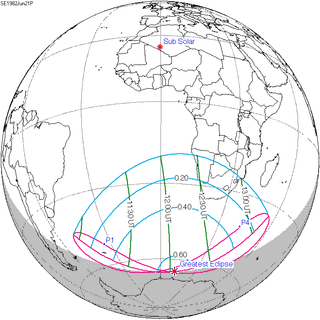 June 21, 1982 |
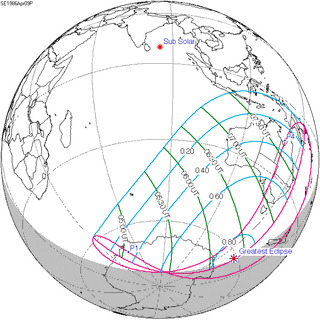 April 9, 1986 |
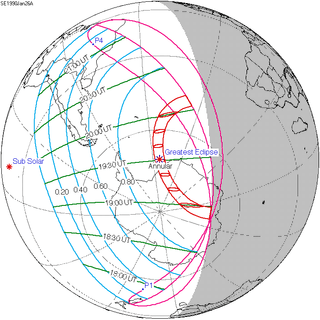 January 26, 1990 |
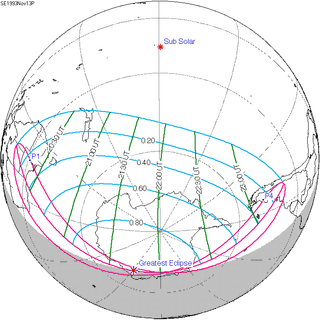 November 13, 1993 |
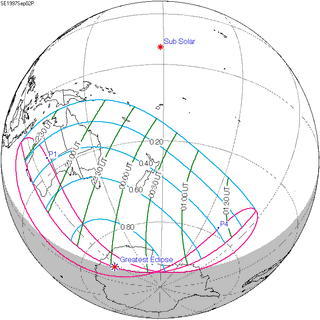 September 2, 1997 |
| 127 | 129 | 131 | 133 | 135 |
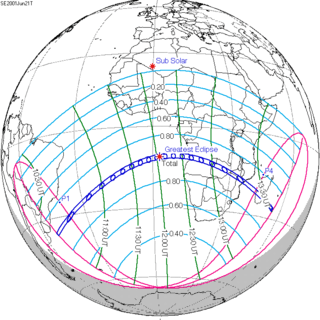 June 21, 2001 |
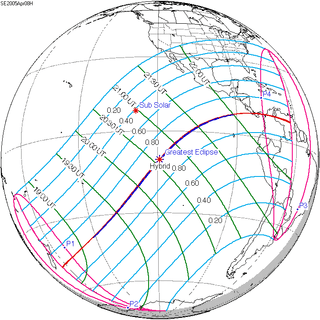 April 8, 2005 |
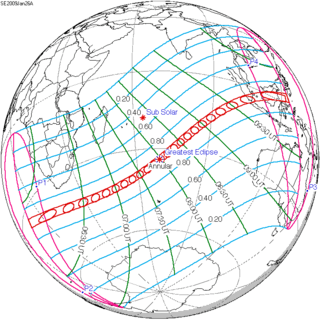 January 26, 2009 |
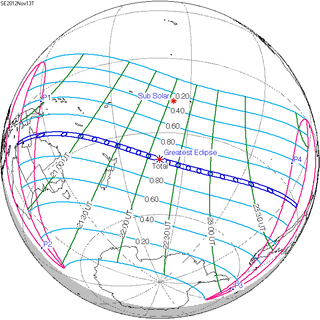 November 13, 2012 |
 September 1, 2016 |
| 137 | 139 | 141 | 143 | 145 |
 June 21, 2020 |
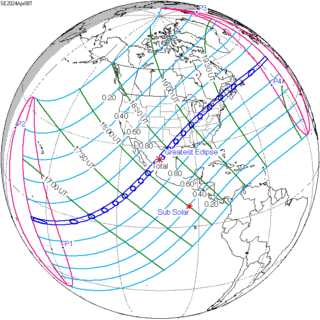 April 8, 2024 |
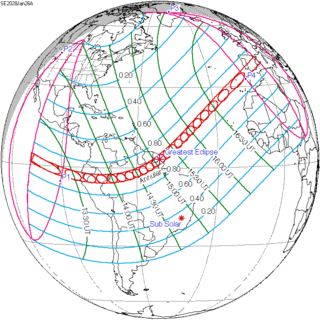 January 26, 2028 |
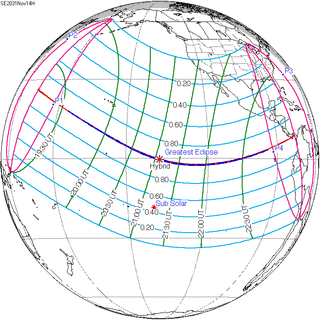 November 14, 2031 |
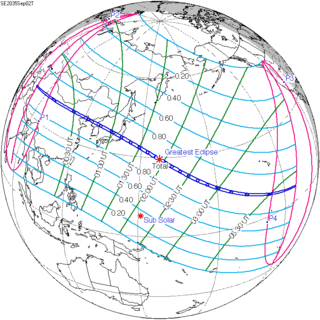 September 2, 2035 |
| 147 | 149 | 151 | 153 | 155 |
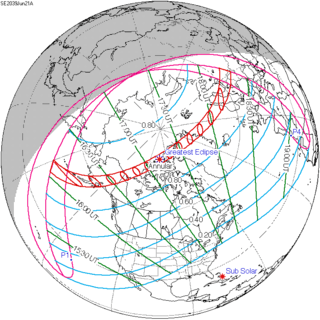 June 21, 2039 |
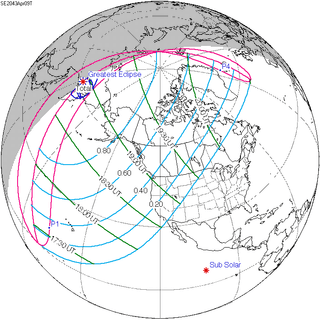 April 9, 2043 |
 January 26, 2047 |
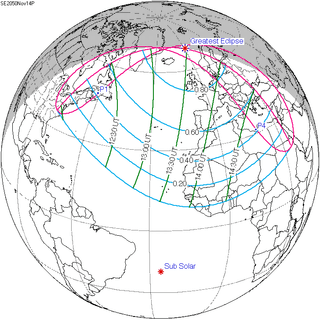 November 14, 2050 |
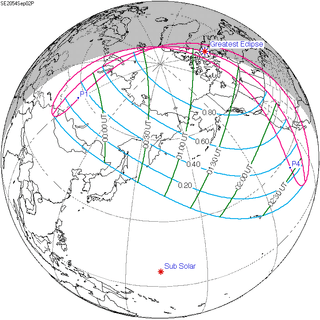 September 2, 2054 |
| 157 | ||||
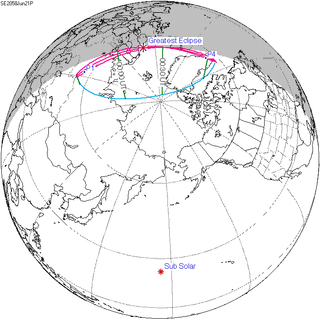 June 21, 2058 | ||||
References
- van Gent, R.H. "Solar- and Lunar-Eclipse Predictions from Antiquity to the Present". A Catalogue of Eclipse Cycles. Utrecht University. Retrieved 6 October 2018.
| Wikimedia Commons has media related to Solar eclipse of 2047 January 26. |
External links
- Earth visibility chart and eclipse statistics Eclipse Predictions by Fred Espenak, NASA/GSFC
.jpg)
